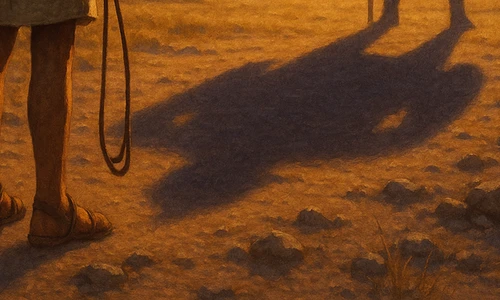We’ve previously seen two reasons for the book of Esther: to record the origin of the Purim celebration and to record Israel’s victory over Amalek.
In addition to wrapping up the multi-millennial battle with an ancient enemy, Esther revisits and attempts to conclude three more themes from Israel’s past: rescue, remnant, and rest.
RescuePermalink
For almost its entire history, Israel has been an outcast nation.
Abraham was born in the city of Ur, in Mesopotamia and called by God west back toward the Mediterranean1, toward Israel.
Barely two generations later, Jacob led the whole clan down into Egypt to escape a famine. Another 430 years, and Moses led the nation out of Egypt and into… the wilderness. Forty years after that, Joshua finally led them into the Promised Land of Canaan, which put them at odds with every nation that already lived there. You know them by name: the Moabites, Ammonites, Amalekites, and more.
Finally, King David defeated Israel’s enemies, and the land had peace—for two generations, until Solomon’s son Rehoboam made a spectacularly bad decision that shattered the kingdom in two, leaving them occasionally at war with each other and always weaker against the surrounding threats, which suddenly included the major empires of the ancient near east: Assyria, Babylon, and eventually Media and Persia.
Which brings us back to Esther.
Throughout their history, from Abraham on down, the people of God found themselves in trouble, and God sent a rescuer. The book of Judges in particular is full of this cycle of rebellion, ransom, rescue… rinse and repeat. (And not just the Israelites; when Ruth the Moabitess and her mother-in-law Naomi needed redeeming, God sent Boaz, and you know how that ended.)
The story of Esther occurs very late relative to the rest of the Old Testament. It is set during the reign of King Ahasuerus, better known as Xerxes I, shortly after 486 BC. The little kingdom of Israel had been swallowed by bigger and bigger empires, until they found themselves conquered and scattered by the Medo-Persians. Xerxes reigned from Libya to India; a larger empire was hard to imagine.
The threat was greater than ever before: Haman’s edict would eradicate every Jew in the empire. There were no Jews outside the empire. This was the end.
Until Esther. Well, and Mordecai. And a sleepless night, a lucky break, a fast, two feasts, a second edict, and two days of brutal fighting. In the end, the Jews were saved: another rescue of the people of God by the hand-picked warriors of God: a beautiful, courageous woman, and a clever, relentless man.
So how does this story of rescue qualify Esther for inclusion in the Bible?
First of all, who doesn’t want to hear that kind of story all the time? The one where the good guys win, the bad guys lose, and Israel prevails? (In fact, Jews read the story of Esther at least once a year, at Purim.)
Second, it must have seemed at the time that this would be the last rescue before the coming of the Messiah, the heir of David. The most powerful empire in the world, far from oppressing them, had just empowered the Jews to defend themselves. That’s a story you want to tell, especially for a nation that, despite having survived Haman, still lived on foreign soil and struggled to sing the songs of Yahweh (Psalm 137:4).
Third, every rescue comes from the hand of God. If God is sovereign over nations, then He orchestrated the deliverance of the Jews, whether the book of Esther mentions His name or not.
The author of Esther wrapped up the theme of rescue for the nation of Israel, leaving the next one to Messiah. As Christians, we know that in fact they were right: Israel stayed under the hand of oppressive powers right up until the day when Caesar Augustus called for a census, and a carpenter and his young, pregnant wife made their way to Bethlehem to be counted.
And that story really is the final rescue; we don’t ever need another.
RemnantPermalink
When you’ve spent more than a thousand years under assault from foreign nations, famines, global empires, and even sometimes your own kinsmen, you start to get really concerned there won’t be anybody left to welcome the savior Isaiah promised you (Isaiah 9:6).
Jacob managed to take everybody with him down into Egypt, and a massive crowd left with Moses, but things kind of went downhill from there. Every time there’s another war, another schism, another evil and unrepentant king, another invasion by one of the massive powers surrounding you, you worry it’s all going to fall apart. You cling to another part of Isaiah:
Unless the Lord Almighty
had left us some survivors,
we would have become like Sodom,
we would have become like Gomorrah
Or yet another part of Isaiah that starts with horror and ends with just a little bit of hope:
If there is a tenth left in it,
that also will in turn be consumed,
as a terebinth, and as an oak, whose stump remains when they are cut down;
so the holy seed is its stock.
Just as God told Moses that nobody who escaped Egypt would live to see the Promised Land (Deuteronomy 1:35), God told Isaiah that the remnant of Israel would be much less than a tenth. (And yet, that would be enough.) And not just Isaiah; here are just a few more prophets who were concerned about the remnant:
- Ezekiel 6:8–10
- Jeremiah 50:20
- Micah 4:7
- 1 Kings 19:18
- Jeremiah 44:14 (like Isaiah 6:13, a remnant of a remnant)
- Amos 5:15
If you’re living in the time of Esther, and you’re a scholar of the Old Testament, like all good Jews (and Christians!), you know this theme threads through every story, and now you’re living it. You’re the last ones left alive, and you’re in danger of falling yourselves. So when Esther and Mordecai manage to save the nation and preserve the remnant yet again, you see it as a fulfillment of centuries of prophecy, and you write it down, and you remember it, and you tell your children. So of course it goes in the Good Book.
RestPermalink
After the remnant are rescued, they finally rest. God instituted the Sabbath rest back on the seventh day of creation, but to understand Esther, we’re only going back to Deuteronomy. Moses says to the people,
“Therefore when the Lord your God has given you rest from all your enemies around you, in the land that the Lord your God is giving you for an inheritance to possess, you shall blot out the memory of Amalek from under heaven; you shall not forget.”
There’s Amalek again, but after that, there is rest. And now the Amalekites are conquered! And the people are rescued! The remnant remains! And we rejoice with the author of Esther,
Now the rest of the Jews who were in the king’s provinces also gathered to defend their lives, and got relief from their enemies and killed 75,000 of those who hated them, but they laid no hands on the plunder.
My eyes, at least, are drawn to that massive number of dead enemies: 75,000. We know that there must be conflict before there can be rest. Joshua, the one Moses expected to lead Israel into rest, had to fight his enemies before he could find rest. And David, too, spent his years at war so that the land could have peace in Solomon’s time.
Esther makes war first with her own fears and doubts through prayer and fasting and then with the King and Haman through feasts and accusations. Finally, the Jews go to war to defend themselves, and God grants them victory. But the author of Esther doesn’t just point at the rest given to the Jews.
When Ahasuerus chooses Esther as his new queen, he throws a feast and declares a “holiday” (in WEB and NLT; “remission” in ESV; “release” in KJV). The reason the translations differ is that the exact meaning of the Hebrew word is somewhat unknown. It might mean something like a bank holiday, or a tax holiday, or a release of slaves and servants, or a cancellation of debts, or… actually, it sounds a lot like the Israelite concept of Jubilee, that sabbath of sabbaths, where every fifty years slaves are released and debts are cancelled and land boundaries are reset. So the story of Esther begins with a strong reference to rest, priming the reader for what’s coming.
The disruption of rest causes the pivotal moment in Esther 6:1, right in the middle of the book, when Ahasuerus can’t sleep one night. He calls for the chronicles of his reign to be read to him and he learns of the time that Mordecai saved him from an assassination plot.
And of course, the story ends in the celebration of the first Purim, which Mordecai specifically intends to celebrate the rest the Jews have won (Esther 9:20–22).
With such a stunning reference to Moses and Joshua and the implication that finally, God has granted them rest and the Jews can relax (as much as one relaxes when one’s nation is occupied by a foreign empire), how can you keep Esther out of the canon? You can’t.
Rescue, Remnant, Rest, and JesusPermalink
Of course, we know the rest of the story.
The defeat of Haman wasn’t the final rescue for the Jews; they had the Macedonians, the Seleucids, the Maccabees, and the Romans to deal with later. The Romans eventually besieged and burned Jerusalem, finally destroying Israel as they had always known it. The remnant was scattered to the winds, and any historian would be hard-pressed to identify a restful period in the life of the Jews from that time until today.
But that analysis looks in the wrong direction.
Seventy years prior to that siege, a child was born to that carpenter and his wife, the child prophesied in Isaiah 9:6. The entire New Testament witnesses that Jesus is the final rescue of the people of God, and we don’t need to look for another. Jesus gathers the remnant, but while every prophet saw the remnant smaller and smaller, Jesus miraculously expands the remnant to include all who confess with their lips and believe in their heart that Jesus is Lord (Romans 10:9). With Jesus, “there is neither Jew nor Greek” (Galatians 3:28), just children of God. Through His death and resurrection, Jesus finally defeated all our enemies and gave us rest (Hebrews 2:14–15,4:9).
Jesus performs the final and total rescue; Jesus makes all humans His “remnant”, and Jesus leads his children into ultimate rest.
Three good reasons Esther was included in the Bible are its importance to the themes of rescue, remnant, and rest that saturate the history of the Jews and demonstrate their reliance on God and His unending covenant faithfulness to them.
But the author and their early audience were mistaken that this story was the last word on these topics, as much as it must have felt that way at the time.
Jesus is the last word. Under the New Covenant, Jesus is the only word. For the modern reader, Esther identifies our need for rescue, remnant, and rest, and points us straight at Him as the solution for all three.
Pointing so powerfully at Jesus is, I think, a great reason to put Esther in the Bible.
-
It has just now occurred to me that Abraham was called from “between two rivers” (Mesopotamia) to “between two lands” (Mediterranea). I doubt there’s some divine meaning to this naming coincidence, but part of my mind remembers that Christians are never really at hom. Until Jesus returns, we straddle the line between heaven and earth. ↩



